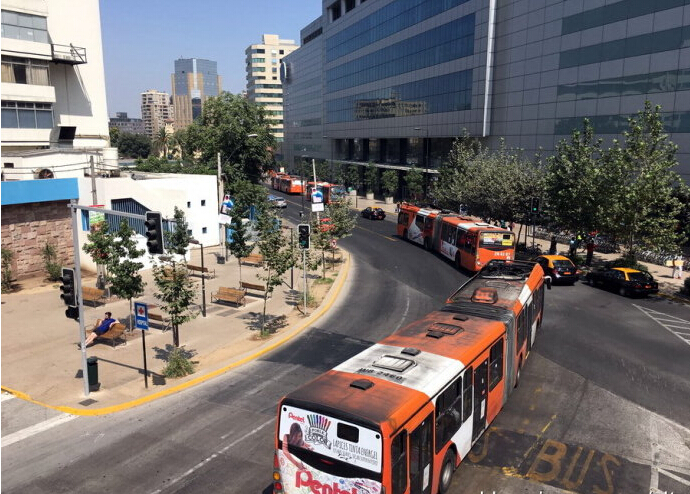The Americas
美洲
Chile: Going Nowhere
智利:無處可去
The Capital's public transport system is sputtering.
智利首都的交通系統飽受詬病。
Transantiago, the Chilean capital's public-transport system, had its tenth birthday in February, but no one celebrated.
智利首都的公共交通系統“圣地亞哥通”在二月份迎來了十歲的生日,但是沒有人為之歡欣鼓舞。
Launched with much fanfare, the scheme was supposed to integrate bus and metro lines and speed up traffic.
在一片鑼鼓喧天中,圣地亞哥通開始問世,該項計劃原本預計能夠整合公交和地鐵線路從而讓交通更為快捷。
Smog-spewing yellow buses disappeared.
噴著煙霧的黃色公交消失了。

Smart cards replaced cash.
智能卡片取代了現金。
But Transantiago is sputtering.
但是,圣地亞哥通飽受爭議。
Fare evasion is rampant, journeys are getting slower and the state has spent billions of dollars to prop up private bus operators.
逃票現象很猖獗,出行速度越來越慢,同時政府已經花費數十億美元來贊助民營公交運營商。
Passengers sometimes wait ages at stops scrawled with graffiti with no inkling of when the next bus will arrive.
有時,乘客得在畫滿涂鴉的站牌下,等候著不知什么時候到站的巴士。
Espacio Publico, a think-tank, calls Transantiago Chile's worst public-policy project since the country returned to democracy in 1990.
一家名為Espacio Publico的智囊團機構把圣地亞哥通稱為智利自1990年恢復民主制以來最糟糕的公共決策項目。
Despite all that, Transantiago has brought some improvements.
盡管如此,圣地亞哥通還是有了一些改進。
The number of fatal accidents has dropped sharply, as has pollution from exhaust fumes.
意外死亡事故與空氣廢棄污染量都有明顯降低。
The system's 20,000 employees are now on formal contracts and have better working conditions than before.
該系統目前有2萬名員工簽署了正式合同,工作環境較之前也更好。
Because bus drivers no longer handle cash, the number of robberies has fallen.
由于司機不再收取現金,搶劫發生的數量也下降了。
Compared with transport in many other Latin American cities, Santiago's works pretty well.
比起其他拉美國家的交通來說,圣地亞哥的確做得非常不錯。
But it would be hard to persuade most commuters of that.
但是,這很難說服大多數的通勤者。
The problems start with design.
這些問題源于其本身的設計。
Planners laid some bus lanes directly over metro lines, so the two forms of transport compete rather than complementing each other.
設計者們讓一些公交車道直接經過地鐵線上方,所以造成了兩種交通方式共同競爭,而不是相互幫補。
譯文來源考研英語時事閱讀











